Regional

It becomes hard to select which food product should be consumed but there are a few steps that can help to get good carbs in your body instead of the harmful ones....
Digital desk: Carbohydrates often find themselves at the center of debates about healthy eating. However, not all carbs are created equal. Understanding the difference between good and bad carbs can empower individuals to make informed dietary choices that promote overall well-being.
Good carbs, also known as complex carbohydrates, are those that provide sustained energy and are rich in fiber, vitamins, and minerals. These include whole grains, fruits, vegetables, and nuts. For example, quinoa, sweet potatoes, and oats are excellent sources of good carbs as they are digested slowly, keeping blood sugar levels stable and providing lasting energy.
On the other hand, bad carbs, or simple carbohydrates, are often refined and processed, lacking in nutrients and fiber. These include sugary snacks, white bread, pastries, and sugary beverages. These carbs cause rapid spikes in blood sugar levels, leading to energy crashes and cravings shortly after consumption.
It becomes hard to select which food product should be consumed but there are a few steps that can help to get good carbs in your body instead of the harmful ones. Consuming the right amount of carbs helps to maintain health, blood pressure, diabetes, and other problems.
Choose whole foods: Opt for whole, unprocessed foods such as whole grains, fruits, vegetables, and legumes. These are rich in fiber, vitamins, and minerals, promoting satiety and overall health.
Read labels: When purchasing packaged foods, read the ingredient list. Avoid products with refined grains, added sugars, and artificial ingredients.
Balance your plate: Aim for a balanced diet that includes a variety of macronutrients, including carbohydrates, proteins, and healthy fats. Incorporate a mix of good carbs, lean proteins, and healthy fats into each meal.
Watch portion sizes: While good carbs offer numerous health benefits, it's essential to consume them in moderation. Pay attention to portion sizes to avoid overeating, especially with foods high in calories and carbohydrates.
Pair carbs with protein and fat: Combining carbohydrates with protein and healthy fats can slow down digestion and help regulate blood sugar levels. For example, enjoy a piece of whole-grain toast with avocado and eggs for breakfast or pair brown rice with grilled chicken and vegetables for dinner.
Stay Hydrated: Drink plenty of water throughout the day, as hydration is essential for proper digestion and overall health.
Leave A Comment